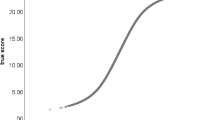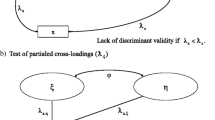Abstract
Over fifty subjects completed four personality measures used in personnel selection. Based on a latin-square design they were asked to fill them in as they would if they were trying to present themselves as ideal candidates for the job of librarian, advertising executive or banker, while on one questionnaire they gave “honest,” actual responses. The results indicated, as previous research in this area has shown, that the questionnaires are all highly susceptible to faking, and that a quite different prototypic profile arose for each of the three different jobs. The results are discussed in terms of the templates of fakers for specific jobs; the methods of detecting fakers, and what dissimulation studies tell us about theories of both occupations and personality.
Similar content being viewed by others
References
Archer, R., Gordon, R., & Kirchner, F. (1987). MMPI response—set characteristics among adolescents.Journal of Personality Assessment, 51, 506–516.
Briggs-Myers, L., & McCauley, M. (1985).A Guide to the development and use of the Myers-Briggs Type indicator. Palo Alto: Consulting Psychologist Press.
Burbeck, E., & Furnham, A. (1984). Personality and police selection: Trait differences in successful and non-successful applicants to the Metropolitan Police.Personality and Individual Differences, 5, 257–263.
Cattell, R. (1969).The 16 PF, Form D, 1969 Edition, Windsor; N.F.E.R. Furnham, A. (1986A). The Social responsibility of the Type A behaviour pattern.Psychological Medicine, 16, 805–811.
Furnham, A. (1986B). Response bias, social desirability and dissimulation.Personality and Individual Differences, 7, 385–406.
Furnham, A. (1986).Lay Theories. Pergamon: Oxford.
Furnham, A. (1990). The fakeability of the 16 PF, Myers-Briggs and FIRO-B personality measures.Personality and Individual Differences. In Press.
Furnham A., & Craig, S. (1987). Fakeability and correlates of the Perception and Preference inventory.Personality and Individual Differences, 8, 459–470.
Furnham, A., & Henderson, M. (1982). The good, the bad and the mad: response bias in self-report measures.Personality and Individual Differences, 3, 311–320.
Kirton, M. (1976). Adaptors and Innovators: A description and measure.Journal of Applied Psychology, 622–629.
Kostick, M. (1977).Kosticks Perception and Preference Inventory. Brookline, Mass.: Applied Psychology Associates.
Holland, J. (1973).Making Vocational Choices: A theory of Careers. Englewood Cliffs, NJ: Prentice-Hall.
Holland, J. (1985).Vocational Preferences Inventory. Odessa, Florida: PAR Inc.
Meredith, G. (1968). Stereotypic desirability profiles for the 16 PF questionnaire.Psychological Reports, 23, 1173–1174.
Myers, I., & McCauley, M. (1985).Manual: A Guide to the Development and Use of the Myers-Briggs Type Indicator. Palo Alto: CPP.
Robertson, I., & Makin, P. (1986). Management selection in Britain: A survey and critique.Journal of Occupational Psychology, 59, 45–57.
Velicer, W., & Weiner, B. (1975). Effects of sophistication and faking sets on the Eysenck Personality Inventory.Psychological Reports, 37, 71–73.
Author information
Authors and Affiliations
Rights and permissions
About this article
Cite this article
Furnham, A. Faking personality questionnaires: Fabricating different profiles for different purposes. Current Psychology 9, 46–55 (1990). https://doi.org/10.1007/BF02686767
Accepted:
Issue Date:
DOI: https://doi.org/10.1007/BF02686767




